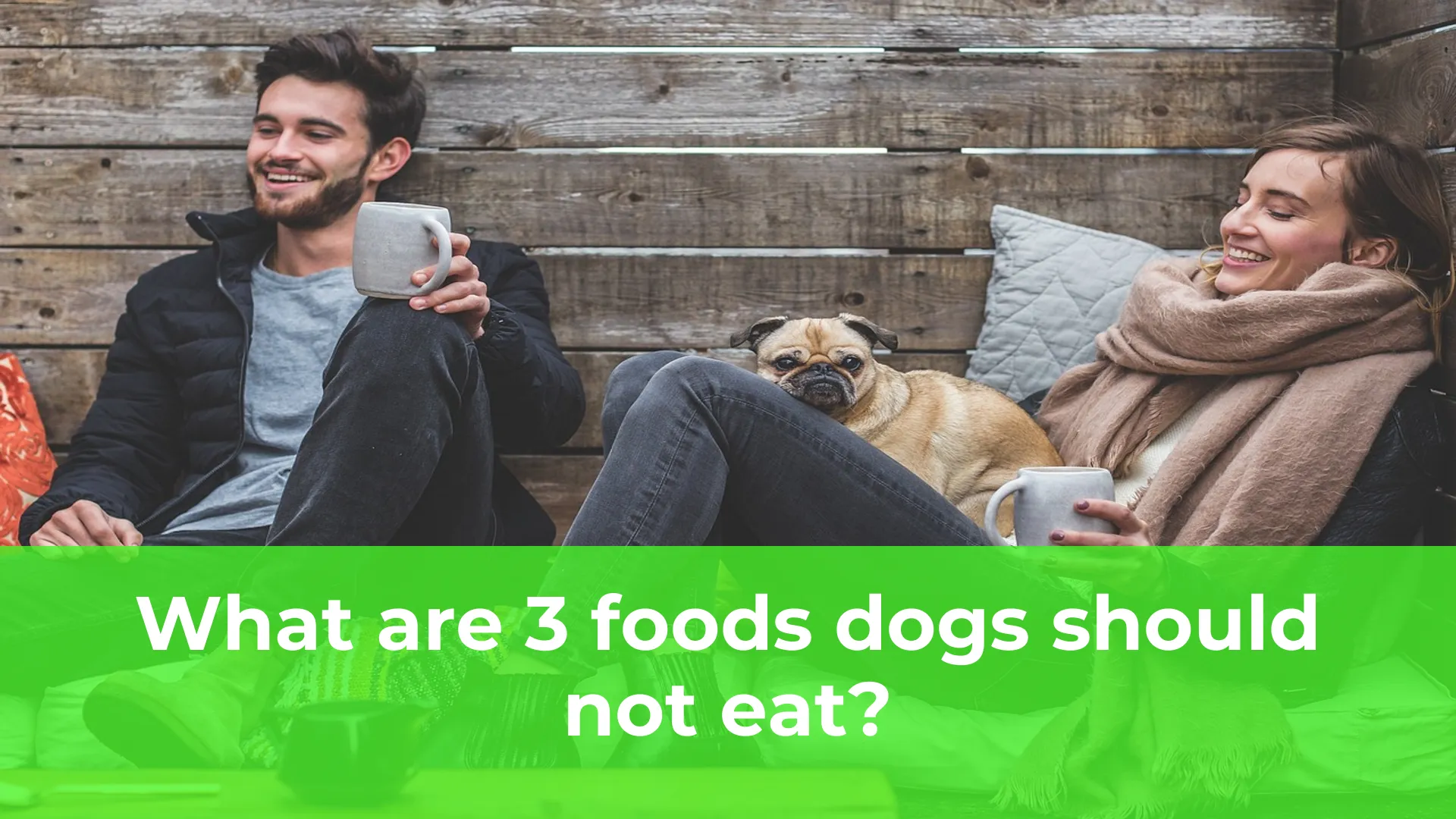What are 3 foods dogs should not eat?
When it comes to feeding our furry friends, it’s important to know that not all human foods are safe for dogs to consume. While some foods may seem harmless or even beneficial, there are certain items that should never make their way into a dog’s diet. In order to keep our canine companions happy and healthy, here are three foods that should be avoided at all costs.
1. Chocolate: While a bite-sized piece of chocolate may be a tasty treat for us, it can be extremely toxic for dogs. Chocolate contains theobromine, a chemical that dogs cannot metabolize effectively. Even small amounts of chocolate can cause symptoms such as vomiting, diarrhea, rapid breathing, increased heart rate, and in severe cases, seizures or even death. It’s crucial to keep all chocolate products out of reach and to seek immediate veterinary help if you suspect your dog has ingested any.
2. Grapes and raisins: Although they may seem like harmless snacks, grapes and raisins can cause serious complications in dogs. Even in small quantities, these fruits can lead to kidney failure, which can be life-threatening. Symptoms to watch out for include vomiting, diarrhea, abdominal pain, decreased appetite, and increased thirst and urination. If you suspect your dog has consumed grapes or raisins, it’s important to contact your vet as soon as possible.
3. Onions and garlic: While these ingredients may add flavor to our meals, they can be highly toxic to dogs. Both onions and garlic contain compounds that can cause damage to a dog’s red blood cells, leading to a condition called hemolytic anemia. Symptoms may include weakness, lethargy, pale gums, rapid breathing, and even collapse. It’s important to double-check ingredients in any food before sharing with your dog, as many dishes may contain onion powder or garlic in some form.
1. Chocolate: A Sweet Treat That Can Be Deadly for Dogs
Chocolate is a beloved treat for many humans, but did you know that it can be deadly for dogs? While indulging in a piece of chocolate may seem harmless, it contains an ingredient called theobromine that is toxic to our four-legged friends. Dogs lack the necessary enzymes to metabolize theobromine effectively, which can lead to severe health complications if consumed in large quantities. As a responsible pet owner, it’s crucial to be aware of the dangers of chocolate and take necessary precautions to keep it out of your dog’s reach.
The severity of chocolate poisoning in dogs depends on various factors, including the type of chocolate and the dog’s size and health. Dark chocolate and unsweetened cocoa powder have the highest theobromine content, making them the most dangerous for dogs. Milk chocolate and white chocolate contain lower levels of theobromine but can still pose a risk if ingested in significant amounts. Symptoms of chocolate poisoning in dogs may include vomiting, diarrhea, rapid breathing, increased heart rate, muscle tremors, seizures, and even death in severe cases.
If you suspect that your dog has consumed chocolate, it’s essential to seek immediate veterinary care. The vet may induce vomiting or administer activated charcoal to prevent further absorption of theobromine into the dog’s system. Treatment may also involve intravenous fluids to flush out the toxin and support the dog’s recovery. Remember, prevention is the best approach – keep chocolate products securely stored away from your dog’s reach and educate yourself and your family about the potential dangers of chocolate ingestion for dogs.
2. Grapes and Raisins: Innocent Snacks That Pose a Serious Threat to Canines
Grapes and raisins are widely consumed snacks enjoyed by many, but what most people don’t realize is that these innocent treats can be extremely harmful to our furry friends. While grapes and raisins may seem harmless, they pose a serious threat to canines. In fact, even a small quantity of grapes or raisins can lead to severe toxicity in dogs, potentially causing kidney failure and even death.
The exact component in grapes and raisins that causes toxicity in dogs is still unknown, making it difficult to determine why some dogs are more susceptible than others. However, it is important for dog owners to be aware of the dangers and take necessary precautions. Even if your dog has consumed grapes or raisins in the past without any ill effects, it is not guaranteed that they will be safe in the future. It is better to err on the side of caution and avoid giving grapes or raisins to your canine companion altogether.
If you suspect that your dog has ingested grapes or raisins, it is crucial to seek immediate veterinary care. Symptoms of grape or raisin toxicity in dogs may include vomiting, diarrhea, loss of appetite, lethargy, and decreased urine output. Prompt medical attention is necessary to prevent further complications and potentially save your dog’s life. Remember, prevention is always better than cure when it comes to protecting our beloved furry friends.
3. Onions and Garlic: Common Kitchen Ingredients That Can Be Harmful to Dogs
Onions and garlic may be staple ingredients in our kitchens, but did you know that they can be harmful to dogs? While they may add flavor to our favorite dishes, these common kitchen ingredients can pose serious health risks to our furry friends. It’s important for dog owners to be aware of the potential dangers and take necessary precautions to ensure the well-being of their pets.
Both onions and garlic contain compounds that can cause damage to a dog’s red blood cells, leading to a condition called hemolytic anemia. Symptoms of onion or garlic toxicity in dogs may include weakness, vomiting, diarrhea, and a rapid heart rate. In severe cases, it can even be life-threatening. As a general rule of thumb, it’s best to avoid giving any foods that contain onions or garlic to your dog, and be cautious of any dishes that may have been seasoned with these ingredients.
It’s also important to note that the level of toxicity can vary depending on the size and breed of your dog. While small amounts of onion or garlic may not have immediate harmful effects on larger dogs, it’s still best to err on the side of caution and avoid feeding them these ingredients altogether. If you suspect that your dog has ingested onions or garlic, it’s crucial to seek immediate veterinary attention to prevent any potential complications.
4. Xylitol: The Hidden Danger Lurking in Sugar-Free Products for Dogs
Many pet owners are unaware of the hidden danger lurking in sugar-free products for dogs: xylitol. Xylitol is a common sugar substitute found in a variety of foods and household products, including chewing gum, candy, toothpaste, and peanut butter. While harmless to humans, xylitol can be extremely toxic to dogs, causing a rapid release of insulin in their bodies, which can lead to a dangerous drop in blood sugar levels. In severe cases, xylitol poisoning can be fatal for dogs. It is crucial for dog owners to be educated about this hidden danger and take precautions to keep their furry friends safe.
5. Avocado: A Nutritious Fruit That Can Spell Trouble for Your Furry Friend
Avocado: A Nutritious Fruit That Can Spell Trouble for Your Furry Friend
Avocados have gained immense popularity for their rich taste and numerous health benefits, but did you know that they can pose a serious threat to your furry friend? While avocados are packed with essential nutrients for humans, they contain a toxic compound called persin that can be harmful to dogs, cats, and other animals. The flesh, pit, skin, and even the leaves of an avocado all contain varying amounts of persin, with the highest concentration found in the pit. As much as we love sharing our favorite foods with our pets, it’s crucial to be aware of the potential dangers to keep them safe and healthy.
6. Macadamia Nuts: Tasty, But Toxic to Dogs
Macadamia nuts, known for their rich and buttery flavor, are a popular snack among many. However, it is crucial to be aware that these delectable nuts can be extremely toxic to our canine friends. While they may seem harmless, even a small amount of macadamia nuts can cause severe health issues for dogs.
The toxic effects of macadamia nuts on dogs can manifest within a few hours after ingestion. Symptoms may include weakness, tremors, vomiting, increased body temperature, and even paralysis in some cases. It is important for dog owners to be vigilant and keep macadamia nuts out of reach from their furry companions.
If you suspect that your dog has ingested macadamia nuts, it is crucial to seek veterinary help immediately. The veterinarian may induce vomiting or administer activated charcoal to prevent further absorption of the toxins. Prompt medical attention can greatly increase the chances of a full recovery for your beloved pet.
7. Alcohol: A Forbidden Drink That Should Never Be Offered to Canines
Alcohol: A Forbidden Drink That Should Never Be Offered to Canines
While it might be tempting to share a drink with your furry companion, it is important to remember that alcohol is extremely toxic to dogs. Even small amounts can have severe consequences on their health and well-being. As responsible pet owners, it is our duty to be aware of the dangers and educate ourselves on the detrimental effects alcohol can have on our four-legged friends.
Alcohol affects dogs differently than humans. Their bodies are not equipped to metabolize alcohol the same way we do, leading to a range of symptoms that can quickly escalate into life-threatening conditions. From vomiting and diarrhea to loss of coordination and even seizures, the effects of alcohol ingestion on dogs can be devastating. It is crucial to keep all alcoholic beverages out of their reach and to never offer them any amount, no matter how small.
8. Raw or Undercooked Meat: A Potential Source of Illness for Dogs
Many dog owners are opting to feed their pets a raw or undercooked meat diet, believing it to be a healthier and more natural option. However, this practice can pose serious risks to dogs and their owners. Raw or undercooked meat can contain harmful bacteria such as Salmonella and E. coli, which can cause severe gastrointestinal illness in dogs. Additionally, dogs can transmit these bacteria to humans through direct contact or by contaminating household surfaces. It is important for dog owners to be aware of the potential dangers associated with feeding raw or undercooked meat to their pets and to take appropriate precautions to ensure everyone’s safety.
9. Caffeine: Beware of the Perils Hidden in Your Morning Cup of Joe
Caffeine is a widely consumed substance that many people rely on to wake up and stay alert throughout the day. However, what most people don’t realize is that there may be hidden dangers lurking in their beloved morning cup of coffee. From potential addiction to negative impacts on sleep, it is important to be aware of the perils that caffeine can bring and make informed decisions about its consumption.
Frequently Asked Questions (FAQ)
What are 3 foods bad for dogs?
Three foods that are bad for dogs are chocolate, grapes, and onions. These foods can be toxic to dogs and should be avoided to keep them safe and healthy.
What are the top 10 toxic foods for dogs?
Chocolate, grapes/raisins, onions/garlic, alcohol, caffeine, xylitol (found in sugar-free gum), avocado, macadamia nuts, raw/undercooked meat, and certain types of mushrooms are the top 10 toxic foods for dogs.
What is the one that you should never feed your dog?
Chocolate. Chocolate contains theobromine, which is toxic to dogs. It can cause symptoms like vomiting, rapid breathing, and even seizures. Keep it away from your furry friend!
What should I absolutely not feed my dog?
You should absolutely not feed your dog chocolate, caffeine, grapes/raisins, alcohol, onions/garlic, avocado, nuts (especially macadamia), and anything sweetened with xylitol, as they are toxic and harmful to dogs.




